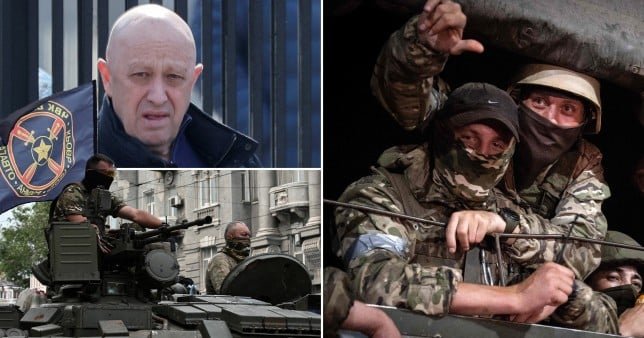Western authorities claim that mercenary leader Yevgeny Prigozhin was forced to improvise his insurrection after security agents discovered his intention to capture Russian military leaders.
The Wall Street Journal says that the leader of the Wagner Group initially intended to kidnap both Valery Gerasimov, the army’s commander, and Sergei Shoigu, the defence minister, during a trip to the south.
However, it’s believed that he changed course after the FSB, the KGB’s successor, received a two-day warning and decided to target Rostov, the city where the Ukraine war is being fought.
Western analysts believe that might explain why the unprecedented uprising fizzled out 36 hours later.
However, his seizure of Rostov, a city of one million and home to a key military command point, suggests senior army officers could have been involved in the plot.
They are said to include General Armageddon, Sergei Surovikin, deputy commander of the ‘special military operation’.
He was replaced by Gerasimov earlier this year when his blitz of critical infrastructure targets failed to turn the tide of the conflict in Russia’s favour.
US intelligence suggests Surovikin could have ‘helped plan’ the rebellion, the biggest challenge to Vladimir Putin’s leadership in the two decades since he came to power.
The Kremlin dismissed the reports as ‘gossip’.
Spokesman Dmitry Peskov said: ‘There will now be a lot of speculation, gossip and so on around these events. I think this is one such example.’
Despite the denial, Surovikin has not been seen in public since Saturday, when he came out and called for the mutiny to be halted.
Security in Moscow was ramped up and residents were warned to stay indoors on Saturday as a convoy of Wagner fighters rumbled towards the capital.
But a near-standoff at the gates was averted when Belarusian dictatorAleksandr Lukashenko, a staunch Putin ally, struck a last-minute deal with Prigozhin ending the unprecedented uprising.
Lukashenko said he had to persuade Putin not to ‘wipe out’ the mercenary chief, after the Russian president vowed to crush the mutiny, likening it to events in 1917 which ended in civil war.
Prigozhin said he never intended to overthrow Russia’s leaders but had marched to save his militia and settle scores with Shoigu and Gerasimov.
He boasted about the speed of the march towards Moscow, saying it exposed serious security flaws in the country.
Under the reported terms of the deal, not all of which are known, Prigozhin was allowed to go into exile in Belarus and pardoned on charges of treason.
Speaking to MSNBC on Tuesday, the US intelligence official Mark Warner said Prigozhin was holed up in one of the only hotels in Minsk without windows in a bid to guard against assassination.

